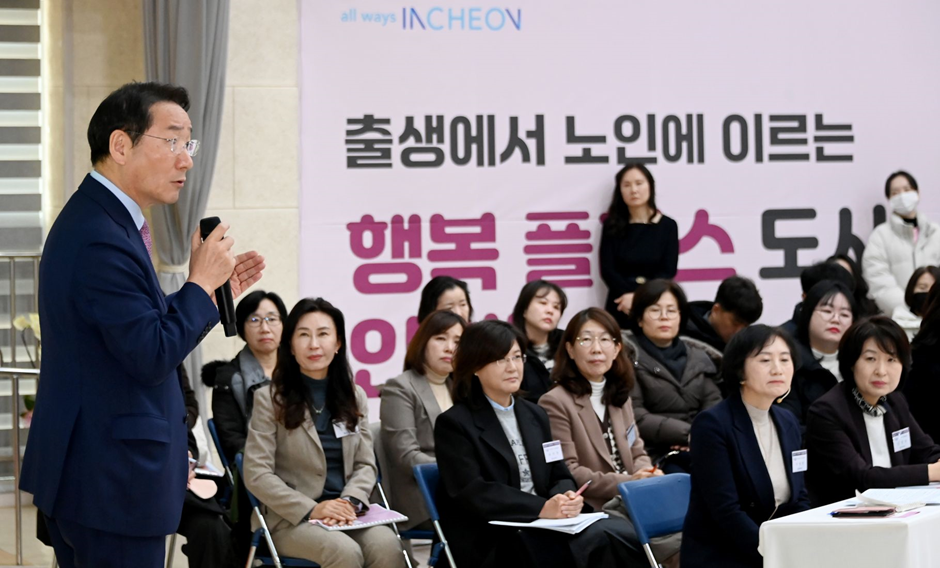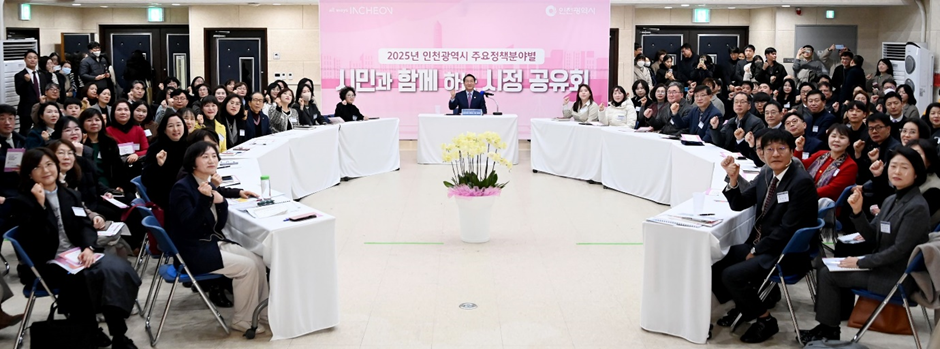- Deeper, warmer care: sharing welfare vision with citizens -
- Strengthening user-oriented, personalized welfare services from birth to elderly years –
On January 8, the Incheon Metropolitan Government held a policy-sharing forum at the Namdong-gu Senior Welfare Center’s auditorium under the theme “Realizing Citizen-Centered Welfare.”
The forum departed from the traditional year-end and new-year practice of internal key task reports and provided a platform to directly share welfare achievements and plans with citizens, who are the actual beneficiaries, and gather their feedback.
In 2025, Incheon’s welfare policies will focus on protecting vulnerable groups, promoting health of citizens, and expanding welfare infrastructure.
Strengthening Support for Vulnerable Groups:
Reducing Economic Burdens and Expanding Tailored Care
In efforts to ease the economic strain on vulnerable groups, the city plans to increase Basic Livelihood Security benefits and the Incheon-style basic income program, “Didimdol Stable Income,” by 6.42%. The support criteria for dependents will be eased, and emergency living support under the Incheon-style SOS Welfare Program will see a 2.14% increase. For persons with disabilities, the basic pension amount will be raised by 2.3% and the number of disability allowance recipients will be expanded.
Furthermore, personalized care services will be improved, including routine and emergency care, integrated care for the severely developmentally disabled individuals, and strengthening of the operation of comprehensive home care centers managed by the Social Services Institute. A dedicated Youth Future Center will be established to support isolated or reclusive youth, while integrated social services will be provided for middle-aged single-person households.
Incheon City to Promote the Health of Citizens
through Strengthened Medical Systems and Preventive Policies
The Incheon Metropolitan Government will establish an emergency medical system for high-risk mothers and newborns and expand public night pharmacies to 34 locations to promote citizen health. These pharmacies will operate from 10 p.m. to 1 a.m. The city plans to increase the number of “Moonlight Children’s Hospitals,” offering outpatient services for pediatric minor illnesses 365 days a year, to eight locations. Measures to enhance early detection and treatment of tuberculosis among high-risk groups, such as senior citizens over 65 and homeless individuals, will also be reinforced. The city will also provide free shingles vaccinations for vulnerable elderly populations and strengthen infection response capabilities through crisis response training.
A walking challenge will be held in March, June, and September to encourage physical activity. The city will also implement policies to build a comprehensive suicide prevention network and provide tailored school meal management support. The government of Incheon also aims to ensure food safety through food poisoning prevention and inspection of high-consumption foods.
Expanding Welfare Infrastructure: Multifunctional Public Facilities and Local Medical and Care Services
To improve welfare infrastructure, Incheon plans to complete a multifunctional public facility in Jung-gu's Unnam-dong by June, integrating welfare centers for the disabled, the elderly, and the general public. A welfare center for individuals with hearing and speech disabilities will start its construction this September in Wanggil-dong, Seo-gu, and a public dementia care center in Galhyeon-dong, Gyeyang-gu, is slated for completion in the first half of next year.
For underserved communities, Incheon is preparing the maiden voyage of a new medical ship, “Geongang (Health) Ongjin.” The city will also expand the “One Island, One Doctor” program to include 12 hospitals offering free medical services. Furthermore, care support programs in vulnerable areas will be expanded to prevent service gaps and strengthen welfare support.
In women and family areas, initiatives will be implemented based on “birth and care policies,” “aging society’s elderly welfare policies,” and “women and family policies.”
Birth and Childcare Policies: Seamless Care Services and
Expanded Support for Childbirth and Parenting
Incheon will expand the eligibility for the “i Plus One Billion Dream” policy to support childbirth and parenting. The number of infertility treatment subsidies will increase to a maximum of 25 procedures per childbirth, with the removal of age limits. Moreover, subsidies will cover treatment interruptions due to complications such as empty follicle syndrome. Also, a new initiative includes providing KRW 1.5 million in postpartum care expenses for vulnerable mothers.
Eligibility criteria for childcare services will be eased to include households with an income up to 200% of the median income. Seamless childcare measures, including the i+ tailored care during the early morning (6-8 a.m.) and late evening (8-10 p.m.) hours, extended care at shared childcare centers during nights and weekends, and sick child care will be introduced, alleviating burdens on working parents and providing comprehensive childcare support.
Policies for Seniors, Women, and Families: Strengthening
Economic Independence and Preventing Career Disruption
As a part of the City’s effort to address the challenges of an aging society, the Metropolitan Retirement Support Center has been newly established to provide financial planning, health consultations, and leisure programs for seniors. Over 55,000 senior jobs will be created to support their economic independence. A dedicated Senior Care Team will also be established to strengthen the safety net for vulnerable elderly populations and improve the quality of care.
In women and family policies, the city will enhance education and support systems to prevent new forms of gender-based violence, such as deepfake-related crimes, and expand victim support mechanisms. Efforts to prevent career interruptions among employed women will include government-aligned initiatives offering tailored vocational training and job placement support. Meanwhile, Incheon will organize matchmaking events for singles and support small, affordable weddings to promote marriage among young people. A Work-Life Balance Support Center and a Metropolitan Family Center will also be established to provide customized family services.
Mayor Yoo Jeong-bok emphasized, “This policy-sharing session is a significant opportunity to listen to citizens’ voices and reflect them in policymaking. Holding the first session under the theme of citizen-centered welfare realization is meaningful.” He added, “We aim to provide comprehensive and compassionate support for vulnerable groups, take responsibility for citizen health from prevention to treatment, and improve welfare service accessibility to ensure no one is left behind.”
“By establishing a welfare system that spans birth to old age, we will create a sustainable city where children laugh, teenagers pursue their dreams, young adults and families find stability, and seniors enjoy happiness,” the mayor concluded.

